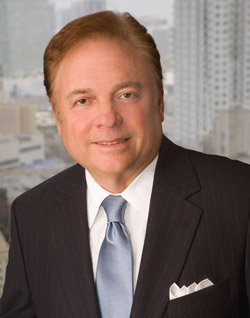Getting in the Way: It's a Lawyer's Job to Do Right, and Deter Wrong

Photo of Steve Zack by Neal Bredbeck
Often we talk about the good that lawyers make possible: the wrongs we right, the facts we uncover, the agreements we shape, the laws we improve and clarify.
But the most important thing we do is often overlooked. Simply put, we get in the way of attempts to shortcut justice.
We get in the way of attacks on a court system that is the envy of the world, by fighting for adequate funding and protecting judges from petty political attacks launched because of rulings that merely follow the law.
We get in the way of attempts to separate and divide our society, and deny basic protections promised all of us in the Constitution and Bill of Rights. We get in the way of treating anyone in this country as less than equal compared to anyone else.
We get in the way of those who would allow our constitutional democracy to wither away from neglect and ignorance. We insist that civics be a part of the curriculum in our schools.
We get in the way of those whose attempts to cut legal aid funding would further widen the justice gap in our country. We get in the way of those who ignore the growing problem of access to justice, sounding the alarm that this growing crisis must be answered. Poor people, the working class, the middle class and small businesses, too, are all finding it difficult and sometimes impossible to get—and afford—a day in court. Access to justice can’t become a luxury item. We ensure that the promise of “equal justice under law” is kept.
We get in the way of those who suggest we start trading our liberties in exchange for security, following Benjamin Franklin’s warning that those who would do so deserve neither. We help preserve the balance of freedom and offer legal solutions that could benefit all.
CIVIL DISCOURSE
This is our calling. This is our career. Being a lawyer is about making a way for what’s good, and getting in the way of what’s wrong.
One of the ways we do this is through advocacy—passionate advocacy—where we use all of our skills in language and presentation to make our point. But good lawyers also know that driving home an argument shouldn’t include sharp words and nasty accusations. The history of the profession is based on civil disagreement. Looking to the future, this is something we cannot lose.
We have to promise each other and our clients that we will disagree in an appropriate manner. We’ll fight the good fights and avoid needless sparring. And when we don’t see eye to eye, we’ll avoid the nastiness that is too easily sparked by our cable-TV-crossfire, anonymous-Internet-posting world.
Rather than calling each other names, we’ll try to remember the famous words attributed to Voltaire: “I may not agree with what you have to say, but I will defend to the death your right to say it.”
UNITING FOR A COMMON CAUSE
The ABA has two very involved members who epitomize this commitment to civilly getting in the way—and making a way—when needed. David Boies and Ted Olson once battled it out in one of the most tense, high-profile legal fights in history: Bush v. Gore. They were worthy opponents, but never enemies. And years after that case, they began to find common cause on crucial legal issues of our times.
We are fortunate that one of those causes is the ongoing crisis facing our court system, felt most acutely at the state and local levels. They have dedicated this year, their minds and their voices to this issue and have promised they will continue to do so as the ABA’s efforts continue.
To see two former opposing legal gladiators form their own dream team has been remarkable. And it is for this reason that they are being honored with the association’s highest honor, the ABA Medal.
Watching two lawyers who know how to do this is a great lesson to all of us in the profession. And it’s one we have to teach, as well, in our professional and personal lives.
Examine your own practice and see whether you are finding enough ways to get in the way of what’s wrong in our society.
Devote some extra time toward helping to advance what’s right for our society. And teach all those around you—in your actions and your words—how to agreeably disagree.
That’s an idea from the days of the quill pen that we must protect, preserve and advance in our digital age.



